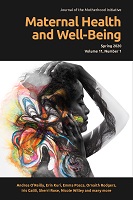Does the Place Where We Are Born Matter?
Abstract
Until the middle of the twentieth century, most births in rural Ireland took place in the home. From then on, childbirth increasingly took place in hospital settings. Not only did this physical relocation of birth from home to hospital affect women’s lived experiences of childbirth and traditional midwifery practices, but both were also inextricably bound up with the complex relationship to women’s bodies and place within the evolving postcolonial Irish state.This article is an historical overview of the uprooting of birth from home to hospital in Ireland. It documents the main policy changes that led to the current obstetric-led, institutionally based maternity system. It highlights how this postcolonial state effectively erased traditional midwifery practices and eventually removed midwifery services from local communities. The subsequent centralization of maternity services led to a huge reduction in maternity units from 108 in 1973 to nineteen today; consequently, there is a very limited obstetrically driven maternity service, which is almost entirely hospital based.
This research is part of my PhD, which is an interdisciplinary art practice-as-research project that uses methodologies employed by feminist ecocritical thinkers, new materialists, cultural geographers, and socially engaged art practitioners; it incorporates oral testimonies, archival material, film, drawings, paintings, and found objects. This complex layered reading of the interrelationships between place, birth, and memory will contribute to a shared knowledge, placing it at the intersection of international research in medical humanities and collaborative, participatory socially engaged arts practices.
Downloads
Published
How to Cite
Issue
Section
License
All intellectual property in relation to material included on this site belongs to the Motherhood Initiative for Research and Community Involvement (MIRCI). All material on this site is protected by Canadian and international copyright and other intellectual property laws. Users may not do anything which interferes with or breaches those laws or the intellectual property rights in the material. All materials on the Motherhood Initiative for Research and Community Involvement (MIRCI) are copyrighted and all rights are reserved. Any reproduction, modification, publication, transmission, transfer, sale, distribution, display or exploitation of the information, in any form or by any means, or its storage in a retrieval system, whether in whole or in part, without the express written permission of the Motherhood Initiative for Research and Community Involvement (MIRCI) is prohibited. Please contact us for permission to reproduce any of our materials. This site may include third party content which is subject to that third party's terms and conditions of use.


